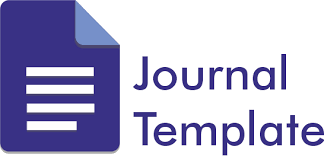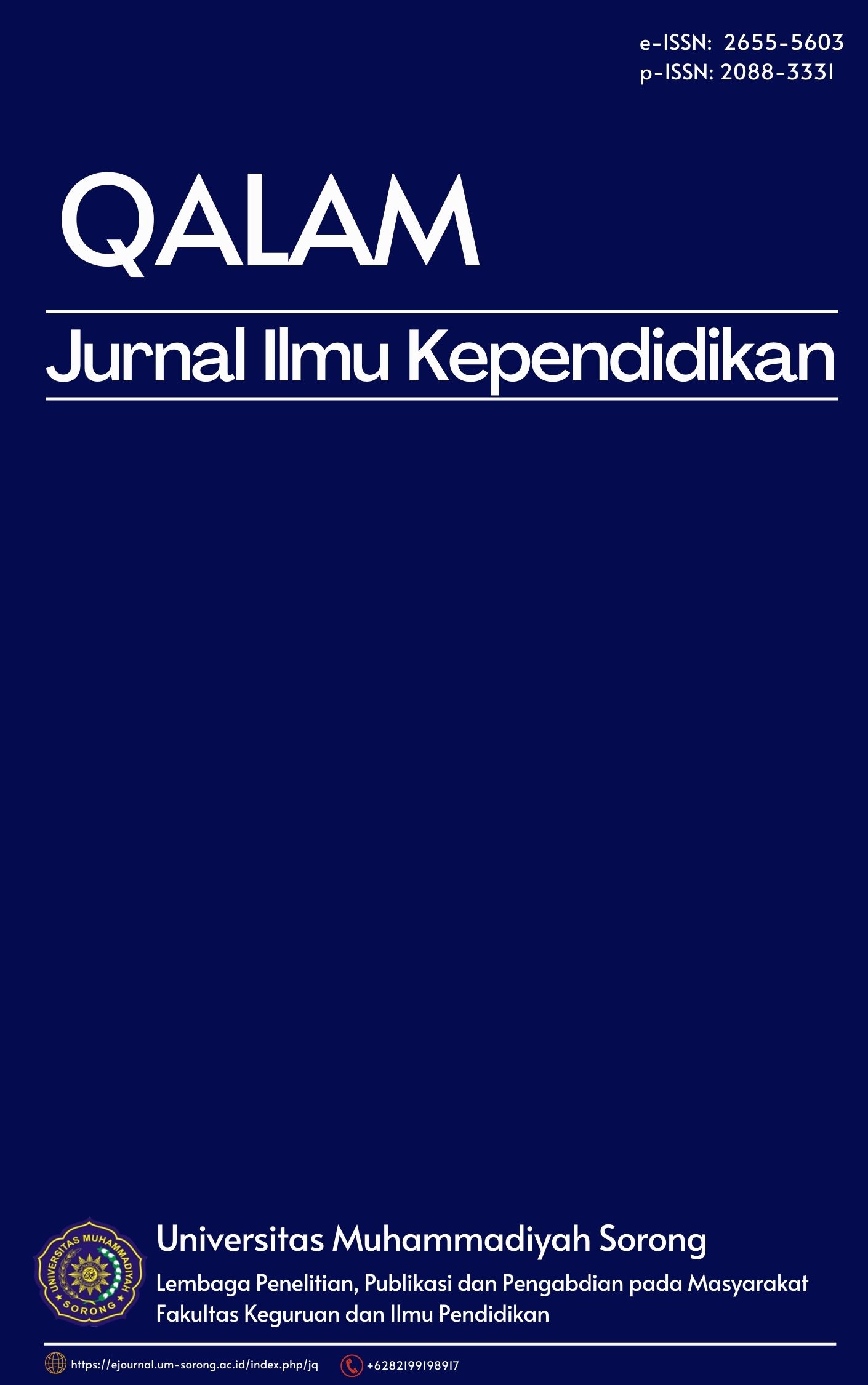MENINGKATKAN HASIL BELAJAR MATEMATIKA SISWA DENGAN MENGGUNAKAN MODEL PEMBELAJARAN KOOPERATIF TIPE THINK-PAIR-SHARE (TPS) PADA SISWA KELAS VB SD MUHAMMADIYAH I SORONG
DOI:
https://doi.org/10.33506/jq.v5i2.257Keywords:
Hasil belajar, Think-Pair-Share, MatematikaAbstract
AbstractÂ
This research aims to describe the Cooperative Learning Model Type Think-Pair-Share (TPS) that can improve students' mathematics learning outcomes. The research was conducted in sorong. The subject of this research was fifth grade class B at SD Muhammadiyah I Sorong in academic year 2010/2011. The students consist of 14 males and 24 females. The research was Classroom Action Research (PTK). The procedure and Implementation at the study site was divided into two cycles. In the first cycle performed four times of implementation by using Cooperative Learning Model Type Think-Pair-Share (TPS). The second cycle took four times with the same model. The observations took with the observation sheet has been prepared, and then reflected by writer and teacher to evaluate the research that has been run on each cycle and to improve the implementation of the next cycle. The technique of data collection was done by using observation and tests. The data were performed with qualitative and quantitative analysis. The results of this study indicate that students' mathematics learning outcomes at SD Muhammadiyah I fifth grade class B increases. At the beginning of test the average was 5,40 and at the end of the first cycle mean score was 5.84. Being at the end of second cycle the average was of 8,09. The action did to stimulate the students' attention by giving preliminary description of matter at the beginning of the meeting, the student group discussions and presentations, providing competition, growing students’ curiosity by implementing the Cooperative Learning Model Type Think-Pair-Share (TPS). Giving the relevance of study based on students' experience and providing them the example that is relevant to students. To increase the students self confidence was done by giving them the opportunity to answer questions and write them down in front, giving verbal praise who are successful, providing the opportunity to the group to present the result of discussion, and provide feedback. To increase student satisfaction with verbal praise who are successful, notify the student test results obtained, and giving appropriate rewards and not excessive.
Â
References
DAFTAR PUSTAKA
Arikunto, Suharsimi. 2006. Prosedur Penelitian Suatu Pendekatan Praktik. Jakarta: Rineka Cipta.
. 2010. Dasar-Dasar Evaluasi Pendidikan. Jakarta: Bumi Aksara.
Budiharso, Teguh. 2009. Panduan Lengkap Penulisan Karya Ilmiah, Skripsi, Thesis dan Disertasi. Yogyakarta: Venus.
Dimyati, Mudjiono.1994. Belajar dan Pembelajaran. Jakarta : Departemen Pendidikan dan Kebudayaan.
FKIP UNAMIN Sorong. Panduan Penulisan Skripsi. 2010. Sorong
Hadis, A. 2006. Psikologi dalam Pendidikan. Bandung: Alfabeta.
Hamalik, Oemar. 2005. Proses Belajar Mengajar. Jakarta: Bumi Aksara.
Hertanto, Ardian Tri. 2008. Upaya Meningkatkan Motivasi dan Prestasi Belajar Siswa Kelas X SMA Negeri 1 Sleman dengan “Mathematics Motivated Learning†Model ARCS. Skripsi, Yogyakarta,FMIPA UNY.
Anonim. http.www.ditnaga- dikti.org/think,pair,share. Didownload pada tanggal 24 Februari 2011
.http.www.readingquest.org/think,pair,s hare. Didownload pada tanggal 24 februari 2011
.http://www.ditnaga- dikti.org/ditnaga/files/PIP/kooperatif.pdf. didownload pada tanggal 14 Februari 2011
Lyman.1981. Think-Pair-Share. Diakses pada 7 Maret 2011 dari http://www.readingquest.org/strat/tps.h tml
Muliati. 2008. Penulisan Karya Ilmiah. Diktat disajikan dalam perkuliahan Penulisan Karya Ilmiah Mahasiswa Jurusan Pendidikan Matematika FKIP UNAMIN Sorong.
Mu’addab, Hafis. 2010. Pengertian Belajar Matematika. http://hafismuaddab.wordpress.com/20 10/01/13/pengertian-belajar- matematika/, Diakses pada tanggal 13 Februari 2011
Nurmiati, 2009. Pembelajaran Matematika dengan Model Pembelajaran Kooperatif Tipe Teams Game Tournaments untuk Meningkatkan Hasil Belajar Siswa. Skripsi, Yogyakarta, FMIPA UNY
Rumini, Sri dkk. 1993. Psikologi Pendidikan.
Yogyakarta: Unit Percetakan dan Penerbitan (UPP) Universitas Negeri Yogyakarta
Sampurno, Agus (2008). Think, Pair and Share (Berfikir, Berpasangan, dan Berbagi Pengetahuan).www.google.co m, diakses 13 Februari 2011
Simanjuntak Lisnawati, dkk, 1993. Metode Mengajar Matematika I. Jakarta: Rineka Cipta.
Slameto. 2010. Belajar dan Faktor-Faktor yang Mempengaruhinya. Jakarta: Rineka Cipta.
Soenarjo, RJ. 2008. Matematika 5. Jakarta: Departemen Pendidikan Nasional.
Sudjana, Nana, Ahmad Rivai. 2007. Teknologi Pengajaran. Bandung: Sinar Baru Algesindo
Sudjana, Nana.2001. Penilaian Hasil Proses Belajar Mengajar. Bandung: Remaja Rosdakarya
Sugiyono. 2010. Metode Penelitian Kuantitatif kualitatif dan R & D. Bandung: Alfabeta.
Suherman, Erman dkk. 2003. Strategi Pembelajaran Matematika Kontemporer. Bandung:JICA- Universitas Pendidikan Indonesia
Sulardi, 2006. Pandai Berhitung Matematika5. Jakarta: Penerbit Erlangga.
Syah, Muhibbin. 2008. Psikologi Pendidikan dengan Pendekatan Baru. Bandung: Remaja Rosdakarya.
Tim Bina Karya Guru. 2001. Terampil Berhitung Matematika untuk Kelas V. Jakarta: Penerbit Erlangga.
Tim Subdit Pembelajaran. 2010. Model Bahan Ajar matematika untuk Sekolah Dasar. Jakarta: Direktorat Pembinaan Taman Kanak-Kanak dan Sekolah Dasar, Direktorat Jenderal Manajemen Pendidikan Dasar dan Menengah, Kementrian Pendidikan Nasional.
Downloads
Published
How to Cite
Issue
Section
License
The article copyright is owned by the author and Qalam: Jurnal Ilmu Kependidikan

This work is licensed under a Creative Commons Attribution-ShareAlike 4.0 International License.




